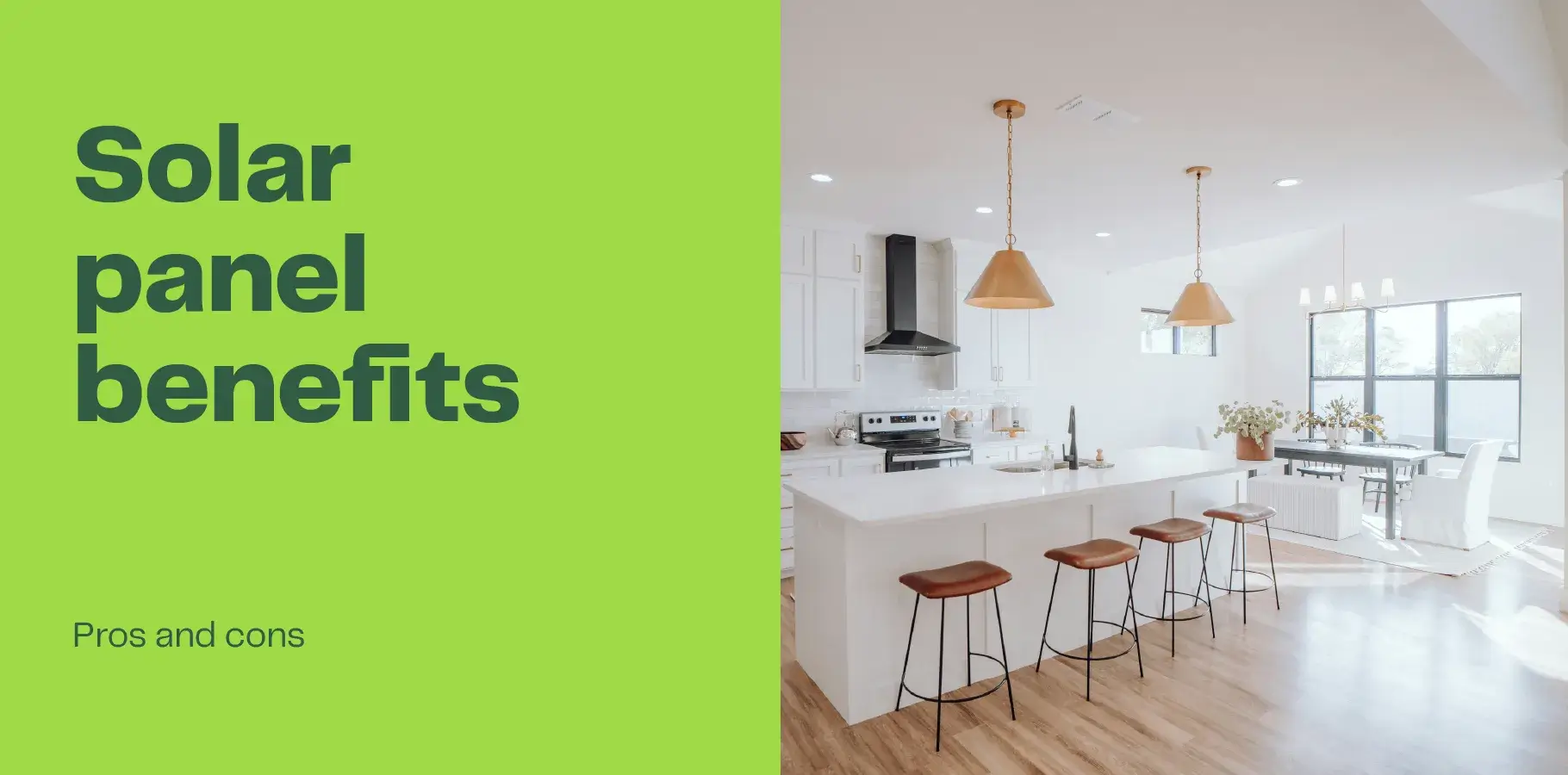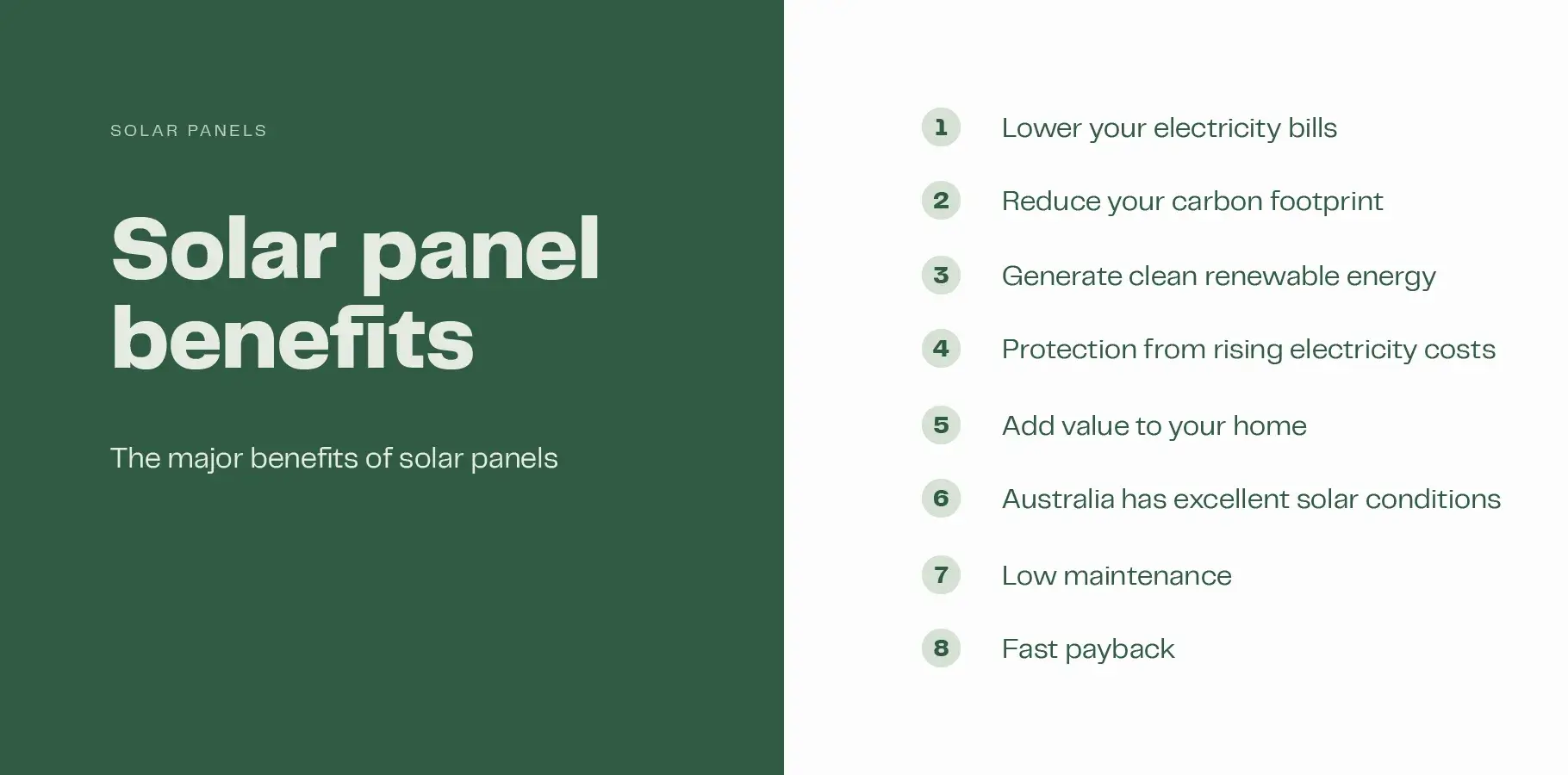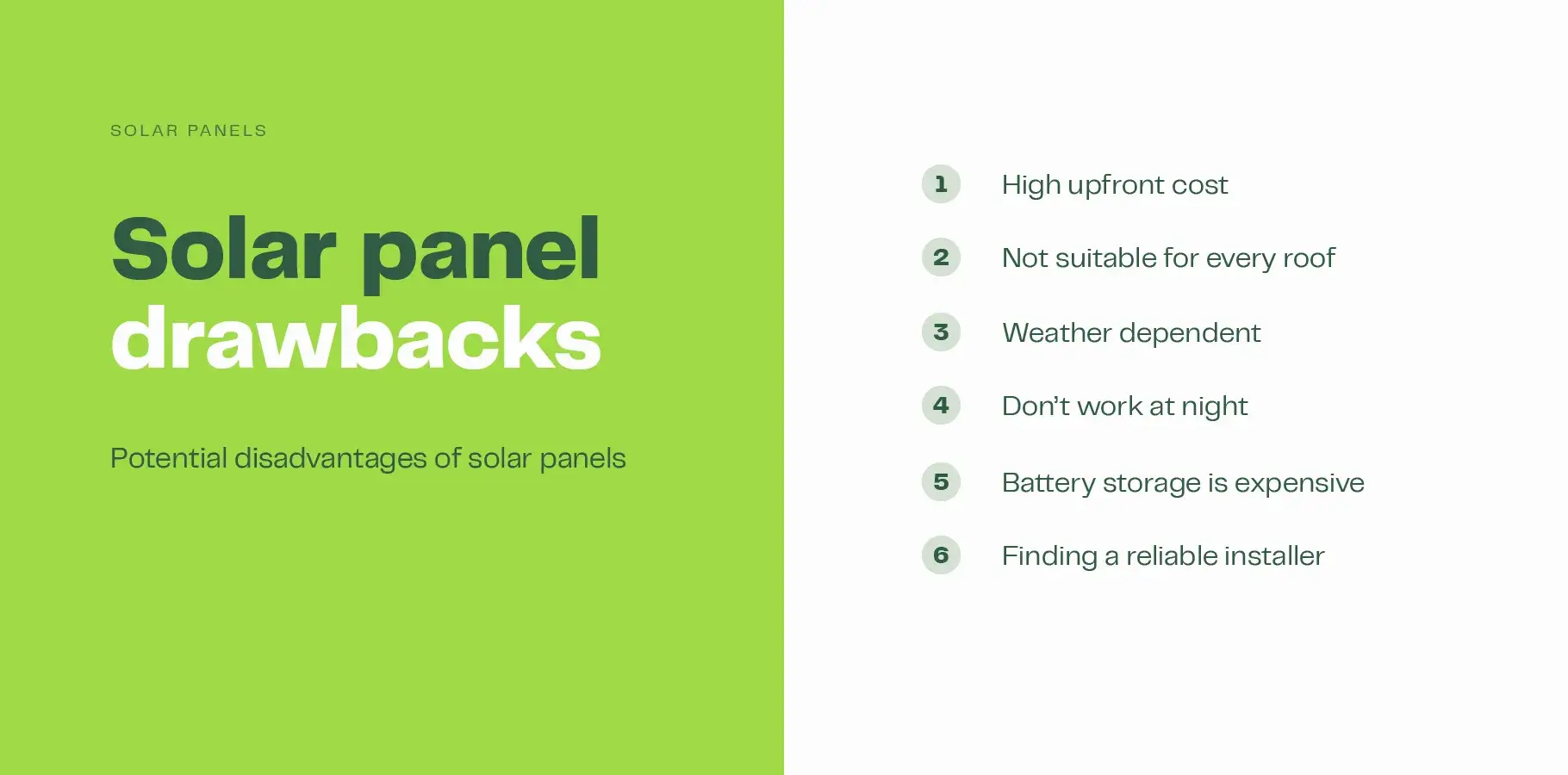Advantages and disadvantages of solar energy
Last updated: January 2024
Reading time: 5 minutes
Over 3.6 million Australian households have decided that the benefits of solar energy outweigh the drawbacks 1.

That’s one in three homes that have lowered their household bills, reduced their environmental impact, and potentially increased the value of their property.
But the benefits of solar’s cost-effective, renewable energy supply don’t apply evenly to every home.
Before you make the switch, we'll help you decide if solar benefits you.
The main pros and cons of solar energy
Here are the common advantages and disadvantages you can expect from going solar.
Pros and cons of solar
| Pros: Top reasons to go solar | Cons: Top reasons not to go solar |
|---|---|
| 1. Save money on your household bills | 1. Relatively expensive upfront costs |
| 2. Reduce your carbon footprint | 2. Solar panels don’t work for every roof |
| 3. Generate clean, renewable energy | 3. Your system will rely on sunshine |
| 4. Protect yourself against rising electricity costs | 4. Your panels will not work at night |
| 5. Increase the value of your home | 5. It can be challenging to find the right installer |
| 6. Take advantage of Australia’s excellent solar conditions | 6. Solar batteries are expensive |
| 7. Experience low-maintenance ownership | |
| 8. Enjoy fast payback plus a long system lifespan |
Advantages of solar energy – Why they’re a good idea for most Australian homes

1. Solar can drastically cut your electricity bills
One of the top reasons for going solar is to reduce electricity bills. As soon as you install your panels, they’ll generate electricity and lower your bills.
In the short term, a typical 6.6kW system can deliver savings of between $300 – $500 per quarter.
2. Solar reduces your carbon footprint
When you switch to solar, you'll lower your environmental impact by using less electricity from the grid, which comes from a mix of sources – mainly fossil fuels.
For example, a 6.6kW solar system can reduce greenhouse gas emissions by over 250 tonnes in its lifetime.
3. Solar generates clean, renewable energy
Solar power is a form of renewable energy that will never run out. So long as the sun is in the sky, there’s no risk of the planet running out of solar power. In fact, the sun generates enough energy in one hour to power the whole planet for a year.
Better yet, solar panels don’t produce any emissions or pollutants while generating energy for your home. This helps improve air and water quality, leading to better public health outcomes.
4. Solar can protect you from rising electricity costs
In 2023, many Australians faced dramatic increases to their power bills, with a price hike of about 20% - 25% affecting households across the country 2.
Rooftop solar offers a solution for homeowners who are tired of rate increases. By allowing you to generate your own energy, solar power reduces your dependence on the grid while providing a safeguard against future rate increases.
Solar panel and battery systems take energy independence one step further. Solar batteries allow you to store your excess solar energy for later use, so you don’t have to buy from the grid at peak times.
5. Solar panels add value to your home
With all the hard work completed, a functioning solar power system is appealing to a wide range of potential buyers.
Different research estimates the impact of solar panels in different ways. However, all sources agree that solar panels can increase the value of your home.
6. Take advantage of Australia’s excellent solar conditions
Thanks to our unparalleled solar resources, Australia has a huge natural advantage for solar energy. We boast the highest solar radiation per square metre of any continent and, therefore, some of the best solar energy potential in the world 3.
7. Solar panels require little maintenance
Once you’ve installed your solar system, it shouldn’t need much maintenance. Typically, solar panels do not even need to be cleaned. The inverter may need to be replaced after 10 – 15 years, but this is the only additional cost you should incur throughout the life of your system..
8. Enjoy fast payback and a long lifespan
In Australia, most solar systems will pay back within 4 – 7 years, thanks to the savings you’ll make on your electricity bills.
Plus, if you buy well, your solar panels will last 25 years or more. For peace of mind, the best solar panels come with a 25-year product warranty.
Disadvantages of solar energy – the challenges you might face when you switch to solar

While solar energy is typically a straightforward financial and environmental decision, for some, it can have its drawbacks. We cover all of the disadvantages associated with buying solar panels:
1. Solar has a high upfront cost
The upfront cost of purchasing solar panels can be can be substantial for Australian homeowners.
A 6.6kW system typically costs between $5,000 – $8,000 depending on several factors, including the quality of the components.
Our Solar Calculator can help you work out the payback period, lifetime savings, and return on investment.
If you want to avoid any upfront costs but still enjoy all the benefits of solar, you can enter a payment plan. Our Solar Loan Calculator will help you understand your monthly repayments and total interest cost.
2. Solar panels do not work equally well on every roof
Solar power potential is largely determined by the direction, angle, and orientation of the panels.
In Australia, rooftops that face north perform the best. For optimised results, the roof pitch of your property should be equal to the latitude angle of your location, with the panels mounted at this same angle.
3. Solar panels rely on sunshine
Solar panels won’t perform as well when the sun is not shining. While panels do still work when it’s cloudy, their output is significantly reduced.
4. Solar panels don’t work at night
Because solar panels need sunshine to produce energy, they don’t work at night.
However, if you want to avoid buying energy from the grid, you can install a panel and battery system that stores the energy produced by your panels during the day, so that you can use it at night.
5. Solar batteries are expensive
Though battery storage has many advantages, it’s not cheap. A 10 kWh solar battery can cost over $10,000.
Some states and territories offer rebates and loans to help with solar battery costs. You can visit our rebate guide to see what’s available in your area.
6. Finding the right installer can be difficult
One of the difficulties of going solar is finding a trustworthy company to supply and install your panels. You want to deal with a company with a proven track record, high accreditation, and first-rate install practices.
Solar Calculator can help you here. We carefully evaluate every company we collaborate with to make sure we connect you with companies that can meet your needs. Start by getting three free quotes today.
Benefits outweigh the drawbacks
For most Australian homeowners, the benefits of solar panels far outweigh the disadvantages.
There are a number of good reasons why you should consider installing solar panels including, saving on your electricity bills and reducing your carbon footprint.
The common barriers associated with getting solar panels can be overcome. While the upfront cost is the major drawback for most homeowners, it is hard to ignore the return on investment that solar energy can deliver.
Next steps
If you want to learn more about whether solar panels might be right for you, take a look at the articles below:
- Are solar panels worth it in 2024? This guide breaks down the costs, savings, and payback period.
- Learn more about the advantages and disadvantages of renewable energy.
- Want to learn more about the technical side of solar? This guide covers everything you need to know about how solar works.

Are you ready for the benefits of solar?
Get 3 free quotes and start your journey towards making the switch.
Get free quotes